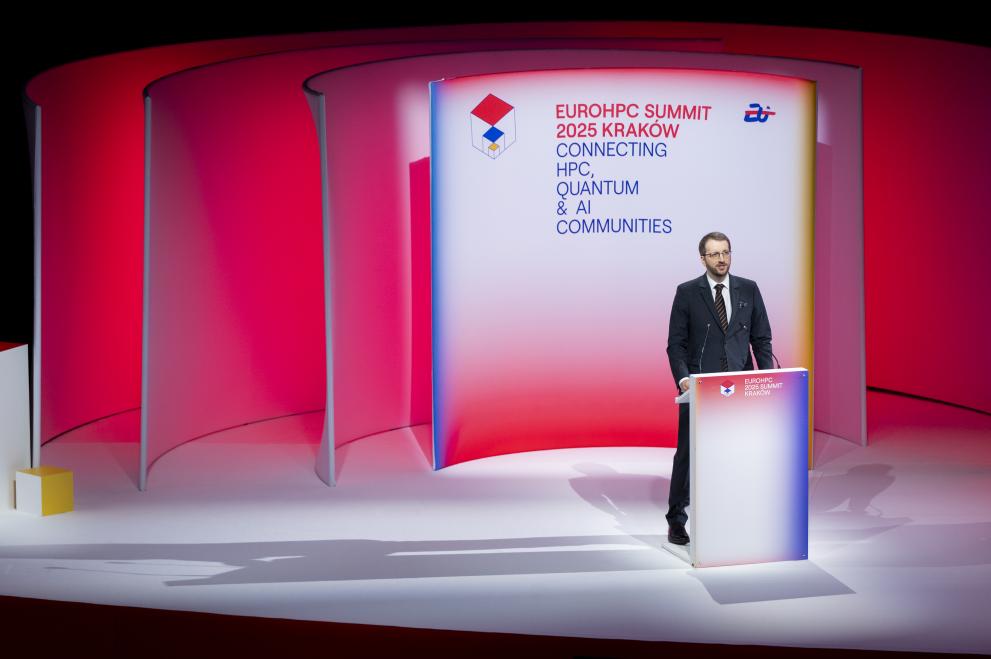
This milestone meeting marked not only the 50th session of the Governing Board but also celebrated five years of EuroHPC JU’s operations as an autonomous organisation. The meeting provided the occasion to officially renew Rafał Duczmal’s mandate, which began in October 2023 and was coming to an end.
According to the EuroHPC JU internal rules of procedure, the Governing Board officially re-elected Mr.Duczmal by secret ballot.
Rafał Duczmal has long been committed to science and European research. He holds a Master of Science degree in Physics from the Faculty of Physics at the University of Warsaw. He began his career as a National Contact Point (NCP) for various EU Research Programmes and has represented Poland as a national expert in several European governance bodies. Notably, he served on the Governing Board of the European Open Science Cloud (EOSC) and participated in the Horizon 2020 Programme Committee for Research Infrastructures.
Mr Duczmal has been closely involved in the EuroHPC initiative since its inception. In 2018, he was appointed Polish EuroHPC Sherpa, advising experts within the Council of the EU during the drafting of the Council Regulation establishing the Joint Undertaking. He has represented Poland on the EuroHPC JU Governing Board since its first meeting in November 2018.
In parallel, Mr Duczmal currently serves as Head of the Global Challenges Section at the National Contact Point Department of the National Centre for Research and Development (NCBR), Poland’s executive agency supporting innovation. In this role, he leads a team of National Contact Points under the Horizon Europe Programme, the European Union (EU)’s flagship funding initiative for research and innovation.
As Chairman, his responsibilities include organising and chairing Governing Board meetings, moderating discussions, representing the Board at external meetings and events, and serving as a key interface between the EuroHPC JU Governing Board and other stakeholders.
Background
The EuroHPC Joint Undertaking is located in Luxembourg. It was established in 2018 and later reviewed through Council Regulation (EU) 2021/1173 to enable the EU to become a world leader in supercomputing.
The governance of the EuroHPC Joint Undertaking is ensured by three bodies: the Governing Board, the Executive Director and the Industrial and Scientific Advisory Board.
The EuroHPC JU Governing Board is composed of representatives of the EU and the EuroHPC JU Participating States. The European Commission and each Participating State appoint one representative to the Board, each of whom may be accompanied by one expert.
The Governing Board is responsible for strategic policy making and funding decisions related to the activities of the Joint Undertaking, including all public procurement activities.
Over its five years of operations, the EuroHPC JU has brought together efforts and resources from the European Union and its EuroHPC JU Participating States with the objective of making Europe a global leader in supercomputing.
To date, the EuroHPC JU has already procured 11 supercomputers, distributed across Europe, equipping the continent with a cutting-edge supercomputing infrastructure. Three of these supercomputers are now ranked among the world’s top 10 most powerful supercomputers: JUPITER in Germany, Europe’s first exascale supercomputer (4th place), along with LUMI in Finland (9th place), Leonardo in Italy (10th place).
European scientists, public sector users, and industry can access these supercomputers via the EuroHPC Access Calls no matter where in Europe they are located. This access supports scientific advancement and the development of a wide range of applications with industrial, scientific, and societal relevance. In the past five years, the EuroHPC JU has granted 145,161,896 node hours, with more than 2,334 projects awarded computing time on EuroHPC systems. Application areas include to name a few: climate modelling, drug discovery, aerospace engineering, and renewable energy research.
The EuroHPC JU is also deploying a European Quantum Computing infrastructure, integrating diverse European quantum computing technologies with supercomputers. Up to now, the EuroHPC JU has procured six quantum computers and co-funded two more through the HPCQS project, all of them located in Europe with two additional systems on the way. The EuroHPC JU already inaugurated PIAST-Q in Poznań, Poland and VLQ in Ostrava, Czechia, marking a milestone in Europe’s leap into the quantum era.
Currently, the EuroHPC JU is also overseeing the implementation of 13 AI factories across Europe that offer free, customised support to SMEs and startups.
Finally, the EuroHPC JU also funds research and innovation projects to develop a full European supercomputing supply chain, from processors and software to applications to be run on these supercomputers and know-how to develop strong European HPC expertise. In the past five years, no fewer than 57 projects have received research grants from the EuroHPC JU.
Details
- Publication date
- 8 October 2025
- Author
- European High-Performance Computing Joint Undertaking